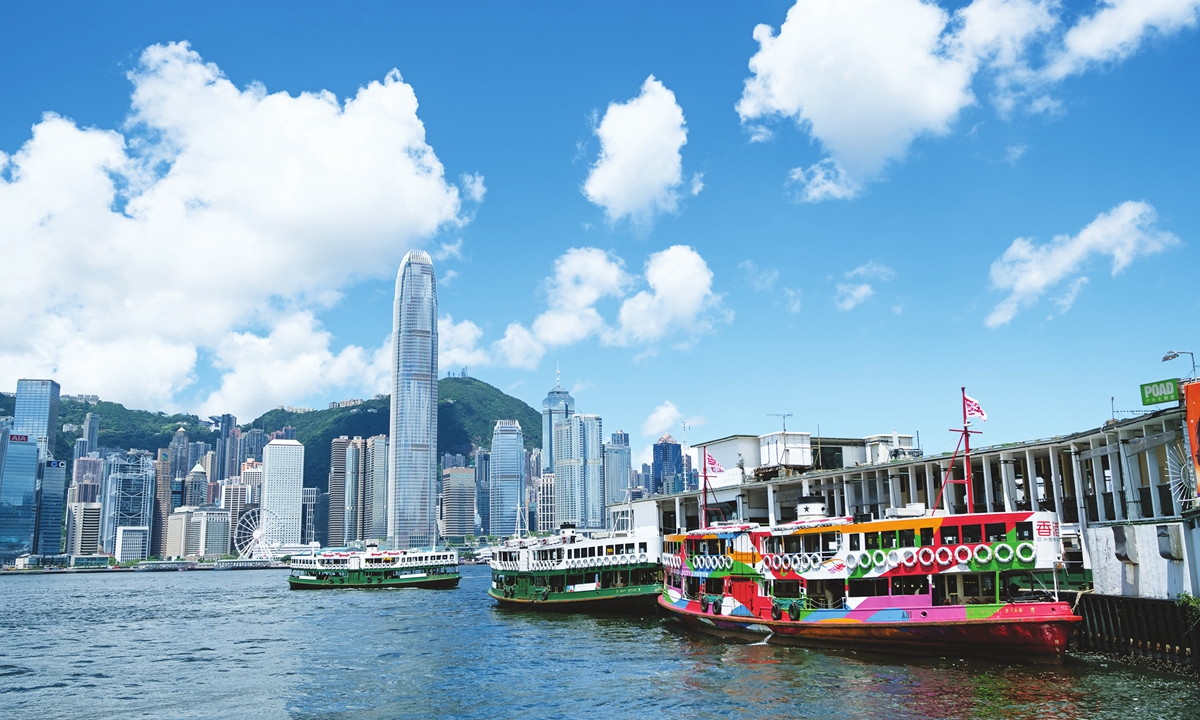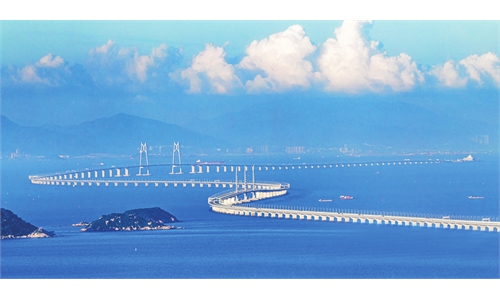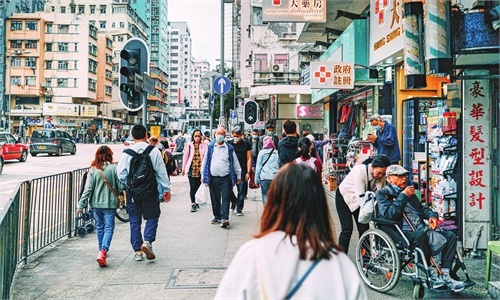Tourist arrivals to Hong Kong surge as new SAR leadership with strong mainland backing to rev up stable recovery

A view of Victoria Harbor in Hong Kong Photo: VCG
The number of tourists from the Chinese mainland traveling to Hong Kong Special Administrative Region (HKSAR) has surged amid a variety of efforts to boost personnel exchanges following full resumption of border crossings. Business insiders and experts said the new HKSAR leadership and Chinese mainland's strong support will help Hong Kong achieve its economic growth target for 2023 and maintain long-term stability and prosperity."It's exciting to revisit Hong Kong after three years. The city is still a shopping paradise and culinary capital," a Beijing-based white-collar worker surnamed Wang told the Global Times on Monday. Wang, who once studied at the University of Hong Kong, decided to travel to Hong Kong with three of her friends in mid-May to attend a concert and do some shopping.
"Compared with 2019, there are some new experiences in Hong Kong. Apart from new landmarks including the Hong Kong Palace Museum and M+ museum, the cultural atmosphere at the Central Market is also impressive," Wang said, noting that it's worth visiting Hong Kong again and again.
Since the re-opening of the border between the Chinese mainland and Hong Kong, the tourism sector in Hong Kong continues to see stable recovery under the leadership of the new HKSAR government with backing from the mainland. Starting from May 15, China resumed the nationwide program for group travel permits for Chinese mainland residents to Hong Kong and Macao.
According to data released by the Hong Kong Tourism Board, there were a total of 4.41 million arrivals to Hong Kong in the first quarter of 2023, recording 2.45 million in March alone, jumping 68 percent month-on-month, mainly from Chinese mainland and Southeast Asia, according to media reports.
Timothy Chui Ting-pong, director of the Travel Industry Council of Hong Kong, said that it would be remarkable if the total number of inbound visitors to Hong Kong could reach around 26 million this year. "Now, tourists have higher requirements for better and more in-depth travel experiences, which means Hong Kong has more work to do to improve its tourism reception capacity, services, and cultural experience so as to sustainably attract inbound visitors," he said.
Bright prospect
Led by the strong recovery of inbound tourism and local demand, Hong Kong's economy posted a noteworthy recovery in the first quarter of 2023, with its real GDP up 2.7 percent year-on-year.
Looking ahead, experts expressed confidence for the development prospects of Hong Kong, mainly thanks to the resilience of the Hong Kong economy as well as the leadership of the new HKSAR government with strong backing from the mainland.
"The social unrest in 2019 and the three-year COVID-19 outbreak indeed battered the Hong Kong economy, but the city has bid farewell to chaos and entered a brand-new stage," Chui said, noting that Hong Kong still has advantages in its legal system, alignment with the world, and an international business climate.
"From the hustle and bustle at ports linking Shenzhen and Hong Kong, we have a clue that inbound arrivals to the HKSAR are on route to be at a level seen in pre-pandemic 2019. The mainland and the city are ramping up efforts to provide convenience to promote personnel exchanges and boost the HKSAR's economy," Song Ding, a research fellow at the Shenzhen-based China Development Institute, told the Global Times on Tuesday.
The HKSAR government has rolled out a series of policies to bolster the economy over the last year. For example, the HKSAR Chief Executive John Lee Ka-chiu unveiled a campaign called "Hello Hong Kong" in February, calling on visitors to come back to the city with the distribution of 500,000 free air tickets.
At a press briefing on May 12, the HKSAR government Economist Adolph Leung said inbound tourism will continue to be one of the major drivers of Hong Kong's economic growth this year, while maintaining a GDP growth forecast for 2023 as a whole at 3.5-5.5 percent.
"Visitor arrivals should recover further as transportation and handling capacity continues to catch up. The improving economic situation and prospects should boost domestic demand, though tight financial conditions will remain a constraint," he said.
Song said that there is no doubt Hong Kong will be able to achieve its GDP target for 2023, which is conservative compared with the swift recovery of the tourism and retail sectors, and besides, the mainland will spare no efforts to offer support to Hong Kong.
Mainland support
The recovery of the Hong Kong economy and strengthening of the city's status as an international financial hub depend on the central government's policy support, and the mainland's stable economic recovery this year will provide strong support for Hong Kong, experts said.
In May, the Northbound Trading of Swap Connect between the mainland and Hong Kong kicked off, marking a fresh move by the central government to support Hong Kong as an international financial center.
Pan Gongsheng, a deputy governor of the People's Bank of China, stressed at the launch ceremony, "The mainland is firmly determined to support Hong Kong's long-term prosperity, stability, and development."
"Hong Kong's development is reliant on the mainland, which is a key partner of Hong Kong's trade, investment, and personnel exchanges. The central government has also come up with a variety of policies to cement the city's standing as an international financial hub," Song said, noting that HKSAR should reposition itself and strive to play an indispensable role in China's development in the new era.
Faced with new international situation, Hong Kong should nurture new growth momentum in order to rev up economic recovery and seek long-term prosperity, Noel Shih, chairman of Young DAB, told the Global Times on Tuesday.
"Hong Kong should seek greater development in new areas including scientific and technological innovations, integration within the Guangdong-Hong Kong-Macao Greater Bay Area, and cultural and art exchanges, while play up the advantages of the One Country, Two Systems policy and its unique advantage of being a bridgehead that connects global resources and the mainland," he said.
Shih said national strategies including the 14th Five-Year Plan, the Belt and Road Initiative (BRI), and the GBA provide Hong Kong with more opportunities, as they could reach greater markets like ASEAN and BRI countries. "Meanwhile, Hong Kong youth could focus on their own advantages like R&D and then put production in the GBA so as to maximize efficiency."


